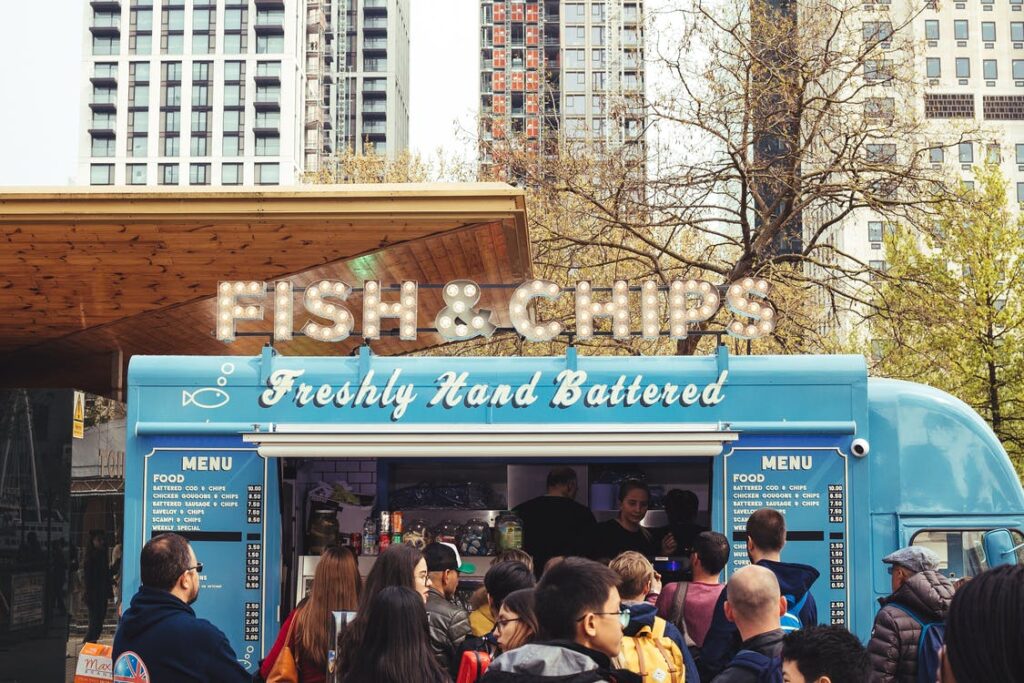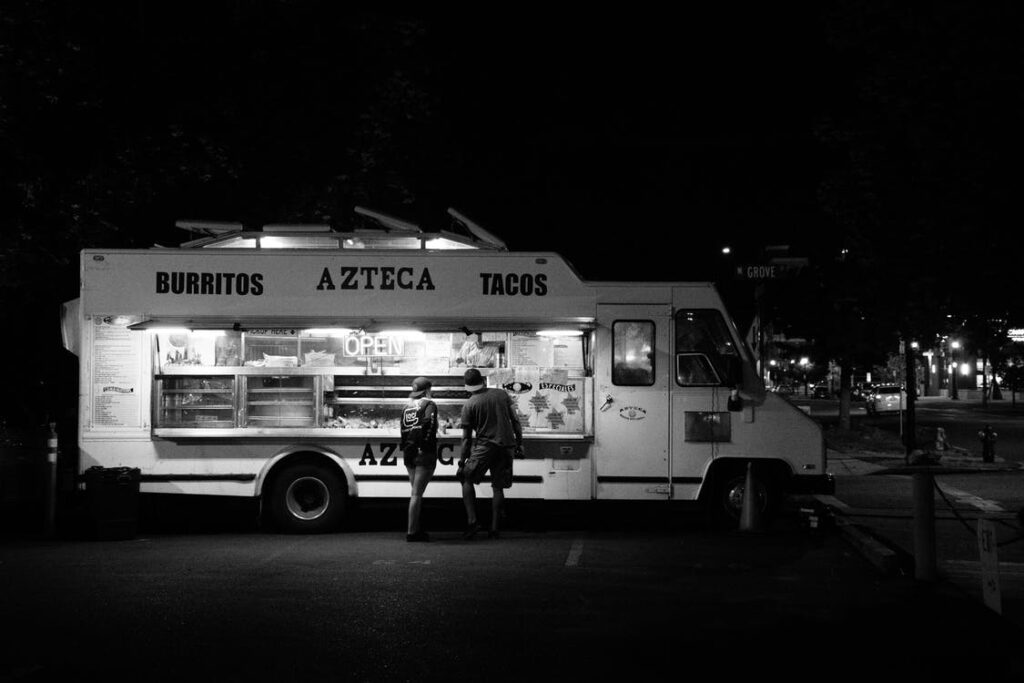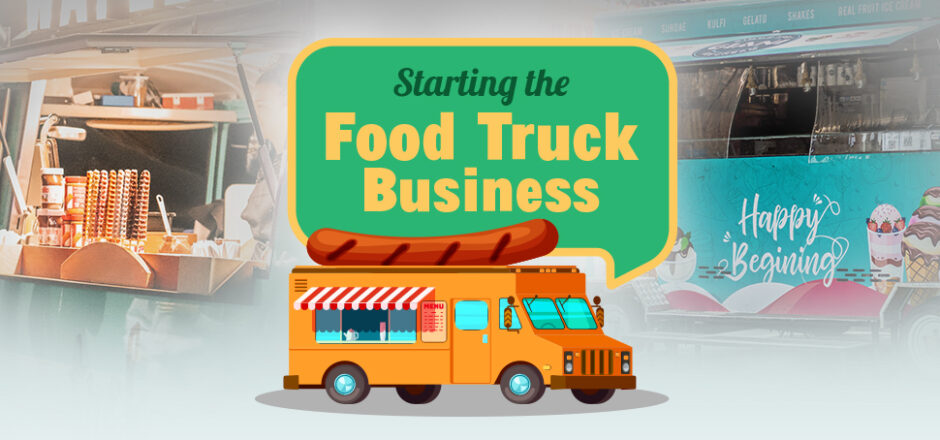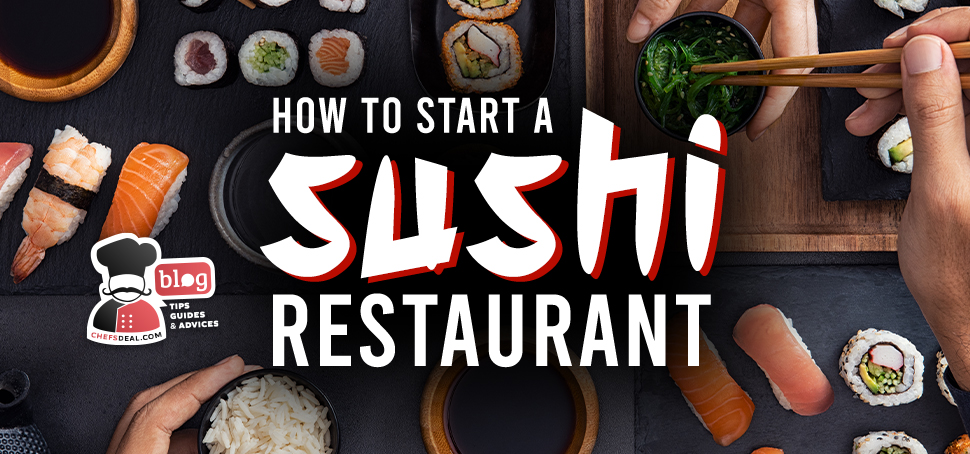After a crazy party or a hilarious concert you had with your friends, you are starving and looking for an open place to eat! A food truck will come to rescue you. With a huge variety of food and the possibility of being located anywhere, a food truck is perfect for late-night eats or fairs, concerts, and party areas. And it is a good option to find on your way to work to have a quick meal.
Furthermore food truck business is a preferred business type for incontestable reasons. At first, you can start with affordable prices. Beginning a food truck is easier and cheaper than beginning a brick-and-mortar restaurant. You can build your business with a sturdy plan, an appealing concept, the right food truck equipment, and a few employees.
We summed up the tips below for starting a food truck business.
1. Make a plan
Every business needs a plan considering budget and marketing goals, including the food truck business. And it would be great if you chose your truck’s name and brand initially. Selecting an attractive title and image representing your food and perception is essential for the first impression.

2. Choose a Concept
You need to decide on a concept before starting your food truck business. You can start by researching the food truck types that already exist in your city, the food kinds people are more interested in, and deciding what food you want to cook and sell. Even if there are millions of food trucks near you, people will look for one more. You will make money, no doubt, but to make more, you can search for a different, more attractive, and new type of food truck or maintain traditional and popular ones.
There is always a type of food truck that no one has in your area. Here are the most loved and profitable ones to give you an idea.
Hot Dog Food Trucks
It is one of the most popular food truck types, and to have a lucrative hot dog truck, you must give importance to the location first. Mobile hot dog trucks can make huge profits if they stop in places that attract a lot of foot traffic. Give weight to choosing fresh and quality buns and hot dogs, as they are the basis of your business.
Sushi Food Trucks
If you own reliable coolers, you maintain and keep the seafood fresh; no obstacle stops you.

Gourmet Food Trucks
Taking a concept that is not common can be a good option to make your food truck stand out. The idea of eating delicacy (fine-dining) food on the go is what people wish for. To create a unique food truck theme and menu, maintaining the quality of the food while cooking complex recipes using fresh ingredients is what you need to do.
Taco Food Trucks
Mexican cuisine has become so popular in recent years. The most common item in Mexican kitchens, taco, is highly preferred due to being a mix of fresh veggies and various tastes. As a taco truck owner, you may have other Mexican dishes on your menu, and you’ll get a jumpstart by cooking with fresh ingredients using quality equipment.

Ice Cream Food Trucks
Nostalgia sells, and what is more nostalgic than an ice cream truck? The music, the bells, the colorful exterior… it is a bundle of joy for any kid outside, and it isn’t just the nostalgia that makes ice cream trucks profitable. It is a logical food truck business model for people who want to experiment and enjoy more flexibility in their job hours. You need to find a good truck with installed freezers and decide on your route and the ice creams you will serve.

3. Food Truck Capacity and Size
Realistically assessing your food truck business needs will save you the trouble of adjusting every other day. Try to estimate the capacity you will need and arrange your freezer and truck size accordingly. The ice cream truck business is fairly flexible, which means you can increase the capacity later on, depending on demand.
4. Choose A Good Vendor
Make sure you have a vendor where you can buy your food, beverages, or ice cream at reasonable prices, and have a few other vendor addresses at your disposal just in case you need a quick refill during a busy day. It will save you time and money and guarantee you won’t run out of food, beverages, or ice cream on a busy day.
5. Get Funding
Besides being cheap, the food truck business requires a considerable financial investment. You’ll need $50,000 to $140,000 on average to begin your business, including the costs of equipment, products, license and permits, branding, and the truck. You can benefit from bank loans or start-up business financing while establishing your food truck business.
6. Purchase Food Truck Equipment
Food truck equipment is the main thing that will make you reach success in your food truck business. The proper food truck equipment that will not disappoint you in any situation will help you greatly in all processes. You’ll need prepping, cooking, holding and warming, refrigeration, and janitorial equipment to efficiently operate your truck.
7. Get The Necessary License And Permits

Legal paperwork is possibly the most crucial point in this exciting venture. You must do your research and find out all about the local regulations surrounding the food truck business. It’s important to know each state, county, and city has its license and permits for food truck businesses.
Having all the permits and being aware of the rules will ensure you don’t encounter any legal trouble or get fined for parking at the wrong places. Last but not least, get insurance. You never know what could happen, so you better be prepared! You can consult your agency to find out all the necessary insurances you need.
8. Find A Proper Location
You need to have a pre-decided route. After checking all the regulations and legal restrictions, plan a course to present you with the maximum number of customers. You can consider parking at food truck parks, streets, nightclubs, bars, and business locations.
Pros And Cons Of Food Truck Business
Of course, entrepreneurship in any industry has its risks. Even if you have a sturdy plan and are passionate about the mobile food industry, starting your food truck business is still challenging. More importantly, it can be hard to maintain long-term success. Therefore, we are here to tell you all the pros and cons of opening a food truck business, so you can decide if it is right for you.
Advantages Of Starting A Food Truck Business
1. Cost of Food Truck Business
The food truck business has become popular lately and has various advantages. The biggest reason for its preference is that it’s cheaper to purchase and design than a restaurant. And since the start-up cost required to start a food truck is lower, there is less risk of entering the catering industry. The average price of starting a food truck business is between $50,000 to $140,000, depending on legal fees, niche market, customization, and state. Food truck businesses tend to have lower management costs and may be easier to control because you probably will only deal with a few employees.
2. Tax Deductions
Food truck business owners can deduct various taxes and fees unavailable to standard restaurant owners, such as the truck itself and truck storage rental fees.

3. Making Your Own Menu
As most chefs dream, you can create your menu and involve your inventions; you are the boss! Depending on your choice, you may have whatever you want on your menu, from sushi and taco to coffee, ice cream, and much more.
4. Finding The Right Location
As a food truck business owner, you can go anywhere you want, meeting varied types of customers. The places where there are many people are the best for you. It may be a crowded street, fair, festival, club, bar, or somewhere touristic. And by being featured at group events like food truck festivals or parties, customers will discover you.
Challenges Of Starting A Food Truck Business
There are also undeniable shortcomings. Cost of fuel, heating, and other maintenance costs are high, and hygiene must be the first thing you give weight to. A food truck can take hours to maintain, exploring locations, cleaning, and more. Especially it isn’t easy to clean the interior of the car if you are cooking foods that contain a lot of oil or produce a lot of smoke. Therefore, when designing your truck, you must consider which materials will be used internally in advance.
Owners of food truck businesses may find it challenging to keep up with zoning restrictions and local regulations, like where they can park their trucks and how long they can stay in one place. As it has become a popular business field, competition is inevitable, and it may be hard to stand out.
Food Truck Equipment Layout
The design of your food truck equipment depends on you. You may customize it yourself as you like, or you may leave it to a professional. You will need to organize your food truck equipment regularly, so making a food truck business plan before starting will help you. To arrange your food truck, you should consider a couple of critical points: truck dimensions, interior space, food truck branding, and food truck floor design.
Food Truck Menus
Where there is a food truck, there may be many food trucks, each with its menus and meals. The diversity of the menus can be the best part. For instance, burgers, pizza, loaded fries, sandwiches, and mac n’ cheese are some of the most profitable food truck menu items. You can decide your menu considering your interests and taste and depending on the people’s interests in your city. So after conducting anterior research, choose a food truck business concept that combines your unique style with community concerns.
Food Truck Business Health Standards and Safety
Most food safety challenges for food truck equipment are through their size. Food truck chefs have a workplace much smaller than private kitchens, making maintaining hygienic conditions on the truck more complicated. Storing foods at safe temperatures, washing all products, cleaning and sanitizing all supplies and surfaces, washing hands, and regularly changing gloves are simple but effective ways to maintain a sanitary environment.
Understanding the food safety-related regulations established by your state and local health authorities is another essential step to developing an effective strategy for your food truck business. Considering the requirements set by the state or country where you are located, you can manage better and provide the necessary health and hygiene conditions.
To Sum Up
A food truck business can be a time-consuming process, yet it is a unique and fun type of business with many opportunities for making a profit and growing. Don’t underestimate the importance of your truck equipment for the most crucial part- food! You will get to the top of the business with mouth-watering dishes and a glamorous truck. As we pointed out, considering every possibility and being prepared is not hard. Now that you know how to start a food truck business, you are ready to begin, and by following the above steps, you will indeed embark on the road to success.







4 comments On 8 Steps to Starting The Food Truck Business
Pingback: Hood Systems for Food Trucks: Keep Your Mobile Kitchen Safe & Clean ()
Pingback: 17 Popular Street Foods of the US ()
Pingback: 8 Essential Mobile Coffee Truck Equipment – Chef's Deal ()
Pingback: 10 Most Popular Food Truck Concept - Chef's Deal ()